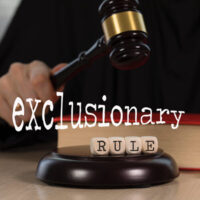A Comprehensive Guide To The Exclusionary Rule (Important Criminal Defense Tool)

The burden of proof rests on the shoulders of the prosecution in any criminal case. It is the prosecution that has the duty of presenting evidence that proves the defendant’s culpability. Evidence is key to any criminal case. The exclusionary rule is a critically important legal protection that helps to ensure that defendants are not published based on unreliable, illegally-obtained, or otherwise flawed evidence. Here, our Orlando criminal defense lawyer explains the most important things that you need to know about the exclusionary rule, including where it comes from, what it is, and why it can be a key tool to protect your rights.
Background: Exclusionary Rule is Derived from the Fourth Amendment
The Fourth Amendment to the United States Constitution protects all people against unreasonable searches and unreasonable seizures. The exclusionary rule is derived from the amendment. In effect, the exclusionary rule is a principle that allows defendants to protect themselves from Fourth Amendment violations.
Understanding how the Exclusionary Rule Protects the Rights of the Accused
The Exclusionary Rule is a legal principle that prohibits the use of illegally obtained evidence in criminal trials. In other words, a defendant can take action to get the evidence recovered in an unlawful search thrown out of the criminal case—meaning the prosecution cannot use it. The rule is essential because it serves as a safeguard against police misconduct and preserves the integrity of the criminal justice system.
As an example, consider a drug possession case in Florida. Imagine that a police officer pulls over a car on the highway for no justifiable reason. During the stop, the officer searches the car without a warrant and finds illegal drugs. As the stop and search were both conducted without probable cause, the defendant’s criminal defense team could take action to get the evidence (the drugs) thrown out of the trial through exclusionary rule. As a result, charges may be dismissed outright.
You Must Be Proactive: Do Not Rely On Prosecutors to Protect Your Rights
In a criminal case, the prosecutor’s role is to prove the defendant’s guilt. They will not always play by the rules. If you believe that the evidence obtained against you was obtained illegally, it is crucial to be proactive and not rely on the prosecutor to exclude it voluntarily. In order to exclude illegally obtained evidence, your Orlando, FL criminal defense lawyer will generally need to file a legal document called a motion to suppress the evidence. The motion must be based on a legal argument that the evidence was obtained illegally, such as a warrantless search or an involuntary confession.
Get Help From Our Orlando, FL Criminal Defense Lawyer Today
At The Baez Law Firm, our Orlando criminal defense attorney fights aggressively and tirelessly to protect the Constitutional rights of our clients. If you were subject to an unlawful search and seizure or if you have any questions about the exclusionary rule, we are here to help. Contact us today to arrange your fully confidential case review. With a law office in Orlando and a law office in Miami, our law firm handles felony and misdemeanor charges throughout the State of Florida.
